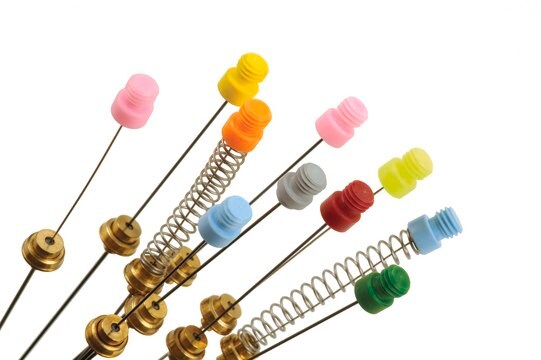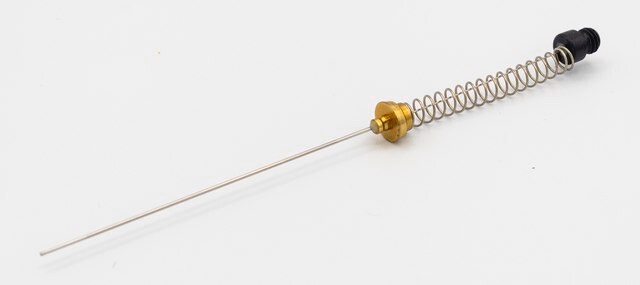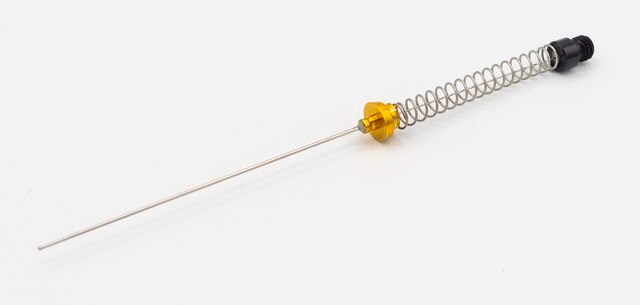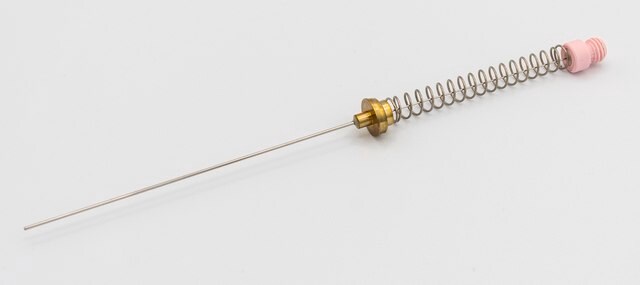57318
Fibra de carboxeno/polidimetilsiloxano (DVB/CAR/PDMS) de SPME
df 75 μm(CAR/PDMS, for use with manual holder, needle size 24 ga
About This Item
Productos recomendados
Materiales
fused silica fiber
plain black hub
Nivel de calidad
tamaño de la aguja
24 ga
envase
pkg of 3 ea
características de los productos alternativos más sostenibles
Waste Prevention
Safer Solvents and Auxiliaries
Learn more about the Principles of Green Chemistry.
sustainability
Greener Alternative Product
df
75 μm (CAR/PDMS)
técnicas
solid phase microextraction (SPME): suitable
fibra Al
1 cm
grupo activo de la matriz
CAR/PDMS coating
aplicaciones
food and beverages
compatibilidad
(For gasses and low molecular weight compounds (MW 30 - 225).)
for use with manual holder
categoría alternativa más sostenible
¿Está buscando productos similares? Visita Guía de comparación de productos
Descripción general
Aplicación
- to extract volatiles from headspace vial of cheese samples.
- to measure dimethyl sulphide concentrations of Ulva lactuca.
- in determination of 2-Heptanone concentrations.
Nota al pie de página
Aplicación
Código de clase de almacenamiento
11 - Combustible Solids
Clase de riesgo para el agua (WGK)
WGK 2
Elija entre una de las versiones más recientes:
Certificados de análisis (COA)
Lo sentimos, en este momento no disponemos de COAs para este producto en línea.
Si necesita más asistencia, póngase en contacto con Atención al cliente
¿Ya tiene este producto?
Encuentre la documentación para los productos que ha comprado recientemente en la Biblioteca de documentos.
Los clientes también vieron
Protocolos
This report demonstrates the potential of solid phase microextraction as a clinical research tool for the extraction of VOCs associated with lung cancer from human breath.
The use of solid phase microextraction (SPME) allowed for the straightforward, fast, sensitive, and accurate GC/MS determination of the residual solvent content of spiked and unspiked samples of hemp extract.
Separation of 4-Methyl-2-pentanone; Dimethyl disulfide; Hexanal; 3-Methylpentane; Acetone
Separation of Sulfur dioxide; Hydrogen sulfide; Carbonyl sulfide; Methanethiol; Ethanethiol; Dimethyl disulfide; Carbon disulfide
Chromatograms
suitable for GC, application for SPMEsuitable for GC, application for SPMEsuitable for GC, application for SPMEsuitable for GC, application for SPMEMostrar másNuestro equipo de científicos tiene experiencia en todas las áreas de investigación: Ciencias de la vida, Ciencia de los materiales, Síntesis química, Cromatografía, Analítica y muchas otras.
Póngase en contacto con el Servicio técnico








